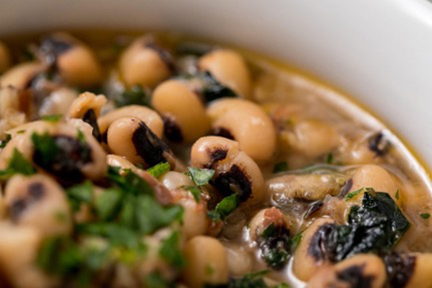The Special Way New Year’s Food Traditions Bind Us Together and Fortify Us For the Days Ahead

Food rituals – even on Zoom – always bring new human connections with them as well as their life-sustaining energy. This year offers a unique opportunity to infuse them with new meaning and spirit.
This week as the New Year rolled in, I kept recalling how a childhood friend introduced me to the tradition of eating black-eyed peas with family and friends on New Year’s Eve. The huge clock hanging over the hearth in her home, with its loud steady intimidating tick-tock and huge black second hand, slowly ticked its way towards midnight on New Year’s Eve. It was an evening when we alternately glanced back and forth at the clock, enjoyed good company, and learned about a southern and mid-Atlantic American tradition that presaged good things for the time ahead.
My family had recently moved to Virginia. We had put down stakes and would be here for years to come. We had migrated from Ohio, with roots in New England.
It took a while for us to assimilate and absorb the beauty and depth of the landscape, culture and people all around us.
Part of that process of assimilation was sitting down together with our bowls of black-eyed peas under my friend’s towering Christmas tree to ring our way — or rather, eat our way — into the New Year. As my schoolyard and backwoods friend explained to me, black-eyed peas — often prepared with pork, collard greens and cornbread — were thought to bring prosperity and good fortune in the new year. For some, the peas resembled coins, the greens resembled money, and the cornbread resembled gold.
Our communion that night was centered around our ritual appreciation of food which also had rich associational meaning to bind us together and keep us moving forward together through time and space.
I would later come to realize this humble but tasty “pea” — actually a bean, botanically speaking— revealed both the bright and the dark sides of early America. It came to America via the Caribbean or West African coast, carried on slave ships. It eventually made its way into the households of both southern and mid-Atlantic colonies and states, and became a signature component of the “soul food” cuisine inspired by our country’s enslaved people.
Black-eyed peas are still grown around the world. They have a long history in our human family’s diet and rituals, originating in Africa as far back as the 2nd millennium B.C. or earlier. Over the millennia the nutrient-dense pea — packed with potassium, iron, folate and protein — has found a special place in cuisines from Lebanon to India to Indonesia, and China, Egypt, Greece and Rome.
But its special place in my life and memory began on that New Year’s eve when my family was invited over to a friend’s home and we got to know each other better and share black-eyed peas as the huge clock finally sounded to let us know it was midnight and another year was born.
Around the world, our ancient food traditions are being celebrated as 2021 takes off. May they fortify us with their auspiciousness and usher in a year filled with healing, health, heroism and joy for all of us.
Thrive Global
2 January 2021